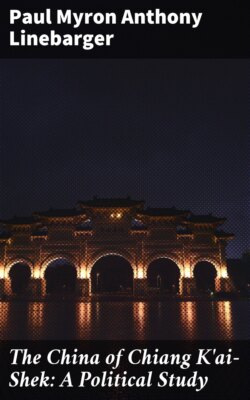Читать книгу The China of Chiang K'ai-Shek: A Political Study - Paul Myron Anthony Linebarger - Страница 22
На сайте Литреса книга снята с продажи.
The Judicial, Legislative, Examination and Control Yüan
ОглавлениеTable of Contents
The appearance of an actual three-power administration—army, government, Party—has led to the sharp relative decrease in importance of the four further Yüan. The Judicial Yüan (Ssŭ-fa Yüan) was even in peace time the least important of the five divisions of the government, failing to display—as an American might expect—a tendency toward effective judicial independence to counterweight the executive and legislative. The Legislative Yüan (Li-fa Yüan), while exceedingly active in the years between the Mukden and Loukouchiao incidents, has been reduced in importance by the coming of hostilities. Its work has been confined largely to drafting the Permanent Constitution, and continued codification of administrative law—particularly for coordination of central government and war area (occupied China) affairs.[25] The Examination Yüan (K'ao-shih Yüan) has attempted to continue in the field of civil service reform, and the Control Yüan (Chien-ch'a Yüan) has maintained war-time efforts.
The Legislative Yüan, under the Yüeh Fa of 1931, consists of a Yüan-chang, a Fu-yüan-chang, and forty-nine to ninety-nine members (Li-fa Wei-yüan), appointed by the Supreme National Defense Council for a two-year term upon nomination by the Yüan President. The term's shortness increases the dependence of members upon the President, and transforms the Yüan to a legislative study institute. Furthermore, the newly-developed People's Political Council has assumed the function of representation. The President of the Yüan retains sole and arbitrary power over the agenda, the final decision, and the allocation of personnel, although the incumbent, Dr. Sun K'ê, is one of China's leading moderates and an exponent of constitutional process, not likely to exercise arbitrary power.
Apart from its significant constitutional powers, which remain unimpaired, the Yüan finds much of its work performed at present through ordinances of the Supreme National Defense Council, administrative action of the Executive Yüan, or commands by the Military Affairs Commission. The jurisdiction retained includes:
(1) general legislation;
(2) the budget;
(3) general amnesty;
(4) declaration of war (never exercised);
(5) declaration of peace;
(6) "other important matters" (which, in practice, has referred to the more open and solemn aspects of treaty-making, and whatever topic may be assigned the Yüan by the highest Party agency). [26]
The Judicial Yüan serves as an administrative and budgetary agency for four agencies. The Ministry of Justice (Ssŭ-fa Hsing-chêng-pu) is, obviously, the prosecuting agency, attached to the executive in the United States, but made a part of the general judicial system in China. The Administrative Court (Hsing-chêng Fa-yüan) is an agency only potentially important; so is the Commission for the Disciplinary Punishment of Public Officers (Kung-wu-yüan Ch'êng-chieh Wei-yüan-hui). The Yüan President is ex officio chief magistrate of the Supreme Court (Tsui-kao Fa-yüan). Wang Shih-chieh says of this Yüan:
Because of the fact that the Judicial Yüan is itself not an organ of adjudication, and since all affairs concerning prosecution at law are handled by the Ministry of Justice, the actual work to be performed by the Judicial Yüan is very simple and light. In addition to framing the budget for the Yüan itself and approving the general estimates of the organs under it, the Judicial Yüan has only three further duties to perform: (1) to bring before the Legislative Yüan legislative measures connected with the Judicial Yüan and its sub-organs; (2) to petition the President of the National Government with respect to such cases as special pardon, commutation of sentence, and the restoration of civil rights; and (3) to unify the interpretation of laws and orders, and changes in judicial procedure.[27]
With peace, reconstruction and prosperity, the Judicial Yüan might acquire importance through its control of the administrative and technical aspects of the court system. Meanwhile, courts are more closely associated with their respective levels or areas of government than with one another in a unified judicial system.
The Examination Yüan, with a President and Vice-President, is composed of a central Yüan office, which supervises two organs: the Ministry of Personnel (Ch'uan-hsü Pu), operating a selective promotion system, and the Examinations Commission (K'ao-hsüan Wei-yüan-hui). In absolute numbers, few examinations have been held. In practice, standard recruitment technique continues to involve introduction, influence, or family connections. The familiarity of such devices in China at least gives them a high polish, and precludes utter inefficiency. Under the circumstances, the Examination Yüan finds scope for valuable, creative work in the preparation of administrative studies and analyses of very considerable importance.
The Control Yüan is of interest to Westerners, because of the novelty of its functions. Through the courtesy of the Yüan President, a full official memorandum on the structure and procedure was prepared, surveying the work of the Yüan during the course of the war. This is reproduced as Appendices I (E) and I (F) below.[28] Some of the unofficial observers, both Western and Chinese, felt that the Yüan possessed further enormous possibilities of activity, and that the need for controlment was very great indeed. In general, the Yüan resembles its legislative, judicial and examination coordinates, in that the war-time executive growth has relegated it to a secondary position.
Decrease in the importance of the yüan system during hostilities cannot be taken, by a too simple cause-and-effect argument, as proof of the unwieldy or impractical character of this five-power system. Measured on a scale of other world governments, success is slow; but it is enormous in contrast to other Chinese central political institutions. At present, it is most improbable that the form of government will be changed, save in the event of catastrophe beyond all reckoning
